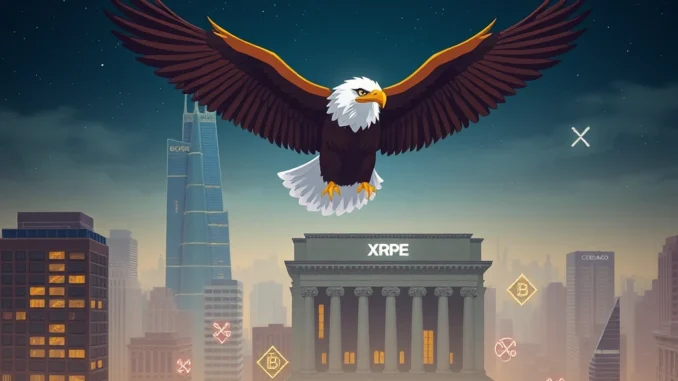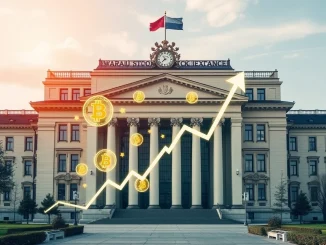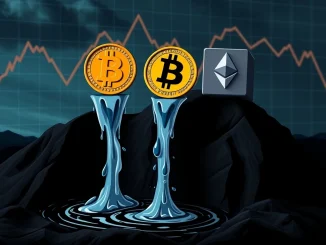
Get ready for a potential game-changer in the crypto world! Leading global asset manager Franklin Templeton has just thrown its hat into the ring for an XRP exchange-traded fund (ETF). This news, first spotted by Solid Intel on X (formerly Twitter), has the crypto community buzzing with anticipation. Could this be the catalyst XRP needs to break into the mainstream investment landscape? Let’s dive into what this exciting development means for you and the future of digital asset ETFs.
What’s the Buzz About Franklin Templeton’s XRP ETF Filing?
In a move that has sent ripples through the cryptocurrency market, Franklin Templeton, a traditional finance giant managing over $1.5 trillion in assets, has officially submitted an application to list an XRP ETF with the Chicago Board Options Exchange (CBOE). This application, if approved, would allow investors to gain exposure to XRP through a regulated and familiar investment vehicle, much like existing Bitcoin and Ethereum ETFs.
Here’s a quick rundown of what we know:
- Filing with CBOE: Franklin Templeton chose the Chicago Board Options Exchange to list its proposed XRP ETF. CBOE is a well-established exchange known for its expertise in handling complex financial products.
- Solid Intel Scoop: The news broke via a post from Solid Intel on X, a crypto-focused social media account known for uncovering market-moving information.
- Following Bitcoin and Ethereum ETFs: This move comes on the heels of the successful launch of spot Bitcoin ETFs and growing anticipation for spot Ethereum ETFs, signaling a broader acceptance of crypto assets by traditional financial institutions.
- Franklin Templeton’s Continued Crypto Push: This isn’t Franklin Templeton’s first foray into the crypto space. They have been actively exploring and launching various crypto-related products, demonstrating their belief in the long-term potential of digital assets.
Why is a Franklin Templeton XRP ETF Application a Big Deal?
The significance of a major player like Franklin Templeton applying for an XRP ETF cannot be overstated. Here’s why this news is generating so much excitement:
- Mainstream Adoption Signal: A Franklin Templeton cryptocurrency ETF application is a strong indicator of increasing institutional interest in XRP and the broader crypto market. It signals that traditional finance is taking digital assets seriously.
- Increased Accessibility for Investors: An XRP ETF would make it significantly easier for retail and institutional investors to invest in XRP without directly holding the cryptocurrency. This accessibility can unlock a massive influx of capital into the XRP ecosystem.
- Validation for XRP: Despite past regulatory uncertainties, an ETF application from a firm like Franklin Templeton acts as a form of validation for XRP as a legitimate digital asset. This could boost investor confidence and market sentiment.
- Competition and Innovation: Franklin Templeton entering the XRP ETF race could spur other major asset managers to follow suit, leading to increased competition and innovation in the crypto ETF space.
- Potential Price Impact: Historically, ETF approvals and even applications have had a positive impact on the price of the underlying asset. An approved Franklin Templeton XRP ETF could potentially drive significant demand for XRP, influencing its price positively.
The Road Ahead: What Happens Next with the CBOE XRP ETF?
While the application is a major step forward, it’s important to remember that the process of launching an ETF involves several stages and regulatory hurdles. Here’s what we can expect in the coming months:
- SEC Review: The Securities and Exchange Commission (SEC) will now review Franklin Templeton’s application. This process can take time, often months, and involves rigorous scrutiny of various aspects of the proposed ETF.
- Amendments and Feedback: The SEC may request amendments to the application or provide feedback that Franklin Templeton needs to address. This iterative process is common in ETF approvals.
- Potential Approval or Rejection: Ultimately, the SEC will decide whether to approve or reject the CBOE XRP ETF application. The outcome is uncertain, but the current regulatory climate seems more favorable towards crypto ETFs than in previous years.
- Listing and Trading: If approved, the XRP ETF would then be listed on the CBOE and begin trading, allowing investors to buy and sell shares representing XRP holdings.
Benefits of Investing in a Digital Asset ETF Like an XRP ETF
Why are digital asset ETFs, like the proposed XRP ETF, becoming so popular? They offer several key advantages for investors:
- Simplified Investment: ETFs simplify the process of investing in cryptocurrencies. Investors don’t need to worry about crypto wallets, private keys, or exchange complexities.
- Regulation and Security: ETFs operate within a regulated framework, offering a layer of security and investor protection compared to directly holding cryptocurrencies.
- Liquidity: ETFs are traded on exchanges, providing high liquidity, meaning they can be easily bought and sold during market hours.
- Diversification: While an XRP ETF focuses on XRP, ETFs in general can offer diversification benefits within a broader investment portfolio.
- Accessibility through Traditional Brokerages: ETFs can be bought and sold through traditional brokerage accounts, making them accessible to a wider range of investors who may not be comfortable using crypto exchanges.
Challenges and Considerations for an XRP ETF
Despite the excitement, there are challenges and considerations to keep in mind regarding an XRP ETF:
- Regulatory Uncertainty: The regulatory landscape for cryptocurrencies is still evolving. SEC approval is not guaranteed, and regulatory changes could impact the ETF’s operation.
- Market Volatility: XRP, like other cryptocurrencies, is known for its price volatility. An XRP ETF will be subject to this volatility, which investors need to be prepared for.
- Custody and Security: Ensuring the secure custody of the underlying XRP assets is crucial for an ETF. Custodial solutions and security protocols are key considerations.
- Management Fees: ETFs typically charge management fees, which investors should factor into their investment decisions.
- Market Demand: The success of an XRP ETF will depend on investor demand. While there is significant interest in XRP, the ETF needs to attract sufficient trading volume to be viable.
What Does This Mean for the Future of XRP and Crypto ETFs?
Franklin Templeton’s digital asset ETF application for XRP is a landmark moment. It signals a growing maturity in the cryptocurrency market and a bridging of the gap between traditional finance and the digital asset world. Whether this specific XRP ETF gets approved or not, the trend is clear: major financial institutions are increasingly recognizing the potential of cryptocurrencies and seeking ways to offer regulated investment products to their clients.
This move could pave the way for more diverse crypto ETFs, potentially including ETFs based on other cryptocurrencies or even baskets of digital assets. The increasing availability of crypto ETFs could significantly broaden crypto adoption and integrate digital assets more deeply into the global financial system.
Conclusion: A Potentially Explosive Development for XRP and Crypto
The news of Franklin Templeton’s XRP ETF application to CBOE is undoubtedly an exciting and potentially explosive development for the XRP community and the broader cryptocurrency market. It represents a significant step towards mainstream acceptance and accessibility of XRP. While the approval process is still ahead, this move underscores the growing institutional interest in digital assets and the evolution of the crypto investment landscape. Keep an eye on this space – the future of cryptocurrency ETFs, and XRP in particular, is looking increasingly bright!



